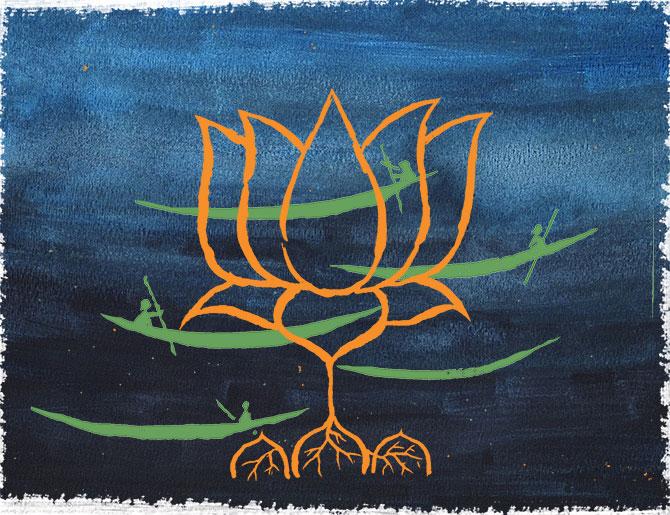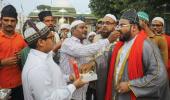A punitive majoritarian State can make an example of individuals who raise their voice in criticism of the prime minister and divisive politics, warns Sunil Sethi.
Illustration: Dominic Xavier/Rediff.com

With every passing day, in actions large and small, the push and thrust of the majoritarian State becomes apparent.
Defining who is an Indian precisely, or what constitutes 'Indianness', has always been a problematic issue for rulers down the ages.
The ambiguities surrounding the question today are evaporating as divisions sharpen in the soil of the janambhoomi.
If you are an Indian-born Hindu, you are relatively safe, whatever the degree of dissent you might profess; being a Muslim, however, could cast you in a wider penumbra of being 'The Other' for doing the same.
It carries the risk of being sidelined, excluded, or even punished -- as in the recent case of the overseas Indian writer Aatish Taseer.
Many see the unanimous Supreme Court judgment on Ayodhya as a nuanced and politically pragmatic balancing act between contesting Hindu and Muslim claims to the site.
The best that can be said about the verdict is that calm has prevailed and a conflagration avoided.
But those in disagreement argue that Hindu proponents of the Ram temple have been unfairly rewarded for acts of destruction and demolition of the mosque by being handed over the entire 2.77 acre site; Muslim contestants have been relegated to second best by the allocation of 5 acres to build a mosque elsewhere.
It is not only Hyderabad MP Asaduddin Owaisi who has dismissed the compromise as an act of unwanted charity ('the Supreme Court is supreme, but not infallible'); retired Supreme Court judge A K Ganguly says he is 'perplexed and disturbed' by the judgment and the Supreme Court's failure to protect the rights of minorities.
'It is... undeniable that the mosque was demolished by sheer act of vandalism. Even the Supreme Court has in its verdict said that it was a gross violation of rule of law and act of vandalism. In that scenario the question is that who has been wronged. It is the minorities that have been wronged.'
More than three months after the reading down of Article 377, the Kashmir valley is frozen, now literally as well as figuratively.
A premature heavy snowfall on November 7 buried Srinagar in foot-deep snow and landslides blocked the Jammu-Srinagar highway.
Power outages lasted several days, a precursor to the bitter winter ahead.
Mobility is further restricted, and telecommunication largely crippled with no Internet and restriction on pre-paid mobile connections.
Schools and colleges remain obdurately shut, public transport is at a standstill, and the commerce of everyday life functions is at low ebb.
"Shops open for short periods, from about 6 am to 10 am, more as a sign of civil disobedience than anything else. Students are being bundled in to take their pre-board exams and will be passed regardless of their lack of preparation," reports a Kashmiri colleague on visits to his family.
With an absent civil administration and political leaders, starting with the 81-year-old Farooq Abdullah under arrest, everything is at the behest of the lieutenant governor and his bunch of advisers.
Recourse to the law by those held in jail is arbitrary and limited.
This is governance by coercion, not persuasion.
The inexorable march of a punitive majoritarian State can isolate not only swathes of the population, but also make an example of singular individuals who raise their voice in criticism of the prime minister and divisive politics.
The peremptory speed with which the government cancelled the OCI (Overseas Citizen of India) card of 39-year-old writer Aatish Taseer on account of his paternity is an example of pure pique, widely perceived as petty revenge for his Time magazine cover story that called Narendra Damodardas Modi 'Divider in Chief'.
The ostensible reason for stripping of his OCI status is that he failed to declare that his father was Salmaan Taseer, the Pakistani politician assassinated in 2011 for his denunciation of blasphemy laws.
What makes the injustice of this curious case compelling are the twists of Mr Taseer's personal history: Born in London he was raised in Delhi by his single mother, the columnist Tavleen Singh, at the heart of a Sikh family.
He may not have known his father, but he took his name and, later, wrote poignantly about looking for him in his book, appositely titled Stranger to History: A Son's Journey Through Islamic Lands (2009).
Ms Singh, too, gave her personal side of the story in her political memoir Durbar (2012).
Both accounts have long been in the public domain.
If some niggardly bureaucrat in New Delhi or New York now believes Mr Taseer must relinquish his right of residence, it is also because of amendments to the Citizenship Act since 2015.
From what used to be a Yes/No answer to a question asking if the applicant had ever been a Pakistani or Bangladesh national it has become more exclusionary, demanding answers to parental lineage.
In other words, the home ministry has the discretionary power to call you out as a potential (Muslim) infiltrator or illegal immigrant on the basis of some lost forebear.
Mr Taseer has declared that he will fight his case.
His challenge will question the march of the majoritarian State and give heart to less privileged thousands struggling to prove their 'Indianness'.











